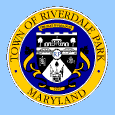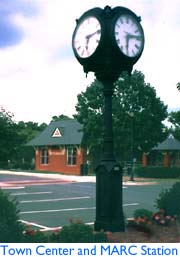
|
Global Navigation Links
Local Navigation Links
|

We want to preserve Riverdale Park's historical legacy while promoting progressive growth in the next millennium. To achieve this, we will encourage development that preserves the unique mixture of land uses, architectural design and styles of the buildings and structures in Riverdale Park. Development will conserve natural resources, foster the development of open spaces and parks, and create a cleaner healthier environment.
We will continue to be an attractive community by encouraging coherence, continuity, attractive design and individuality in our buildings, lots and streets. The town will create and follow guidelines to influence new development, renovation of existing structures, and infrastructure. To achieve our goal of progressive growth in the context of preserving our historical legacy, the town government will use its authority to enforce codes and standards, and exercise influence over zoning decisions.
General Guidelines
The most important general idea is that development provides a place for human beings to live in and use. People want to live in neighborhoods that provide variety, familiarity and a sense of belonging. We must foster development patterns that encourage people to truly live in their houses and neighborhoods. Appropriate size, variation of use, and style are essential elements in a truly human design. Sprawling development projects do not lend themselves to housing true communities and we reject such schemes within our town.
The original developers of Riverdale Park knew that neighborly cohesion required a "core" to the town. Today the idea of the neighborhood core is just as important and central to the well being of Riverdale Park. Luckily, we still have the original Town Center for the neighborhoods west of the Anacostia River, and the newer Riverdale Plaza for areas east of the Anacostia River. These areas are accessible by a quick walk, bicycle ride, or short car trip and can act as the centers each of the neighborhoods require. Cores have uses for both residential and commercial interests such as retail and office space, as well as civic and social facilities for neighborhood gatherings.
New Development And Renovation of Existing Structures
In order to ensure that new development and rehabilitation projects will fit with our vision we propose the following:
Infrastructure
The town will act with determination to have all streets paved to county standards with good drainage and well-maintained sidewalks. In our vision, continuous and protected sidewalks are constructed where possible. The town will continue to maintain street signs with clear markings and signs to protect pedestrians and playing children.We recognize that many of these goals cannot be accomplished without the cooperation of the Town and County in enforcing current standards. Thus, we encourage the Town of Riverdale Park to work towards getting Prince George's County to enforce its building standards. In lieu of this action, it may be necessary for the Town to find the means to enforce county laws. This means the town would issue building permits and insure that developers and property owners are implementing changes that are consistent with the standards set by the town and county.
The town will resolutely enforce both the building and upkeep codes of our county and local municipality. In addition, we envision citizen volunteers helping their neighbors keep their homes and yards neat and in good condition. Finally, the town will insure that all property owners maintain their properties to an acceptable standard.
Properties that have been left in disrepair will be bought by the town (as allowed by Maryland State law) and sold to owners who will restore and maintain them.
This page was last changed on Monday, July 5, 1999. Questions, comments, or submissions? See the Website Committee web page. This page has been accessed 8161 times.
